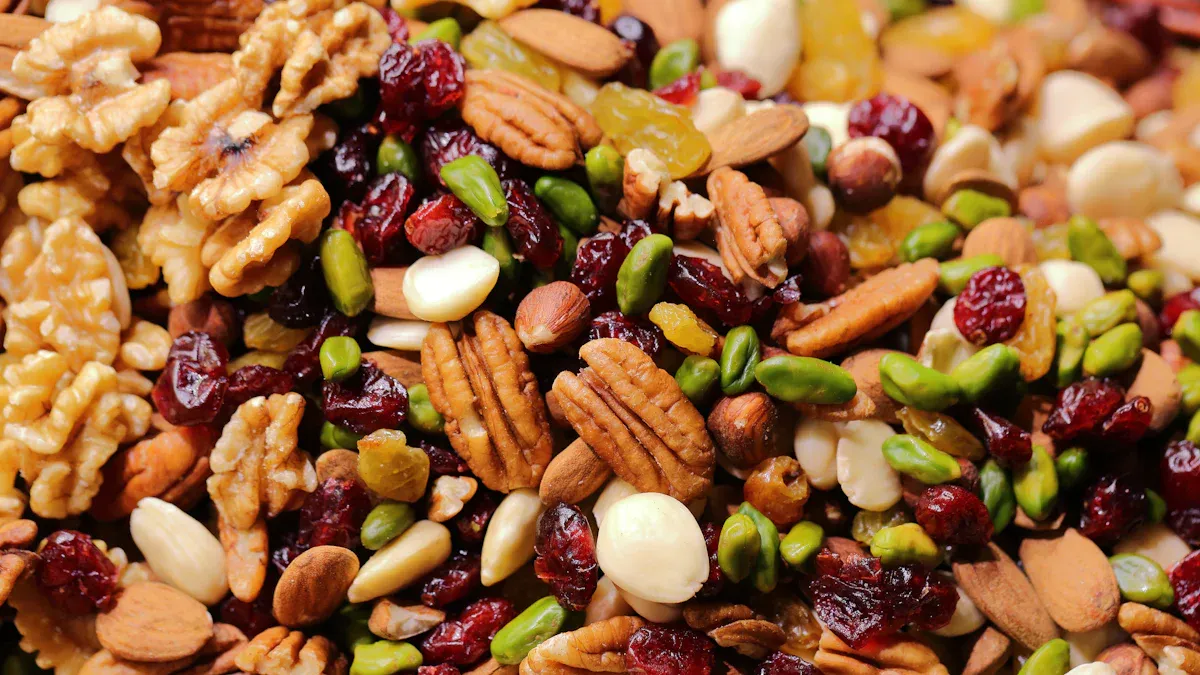
Nuts deliver powerful nutrition in every bite. You get essential vitamins and minerals such as vitamin E, B vitamins, folate, biotin, and selenium. Research shows that nuts can help your heart and support your brain. Scientists found that omega-3 fatty acids and fiber in nuts may prevent disease and boost cognition. I’ve compiled some research about this below. Check out the nutrients found in nuts:
Nutrient | Nuts Rich In |
|---|---|
Minerals | Magnesium, Potassium, Copper, Zinc, Iron |
Vitamins | Vitamin E, B1, B2, B3, B6, Vitamin C |
Notable Nuts | Almonds, Cashews, Pistachios, Walnuts, Pine Nuts, Hazelnuts, Chestnuts |
A single serving of almonds provides about half of your daily vitamin E needs.
Nutritional Benefit | Amount per serving | Percentage of daily recommended intake |
|---|---|---|
Vitamin E | 7.3mg | 50% |
You discover the health benefits of nuts and nutrition every time you enjoy them.
Nuts and Nutrition: Essential Vitamins
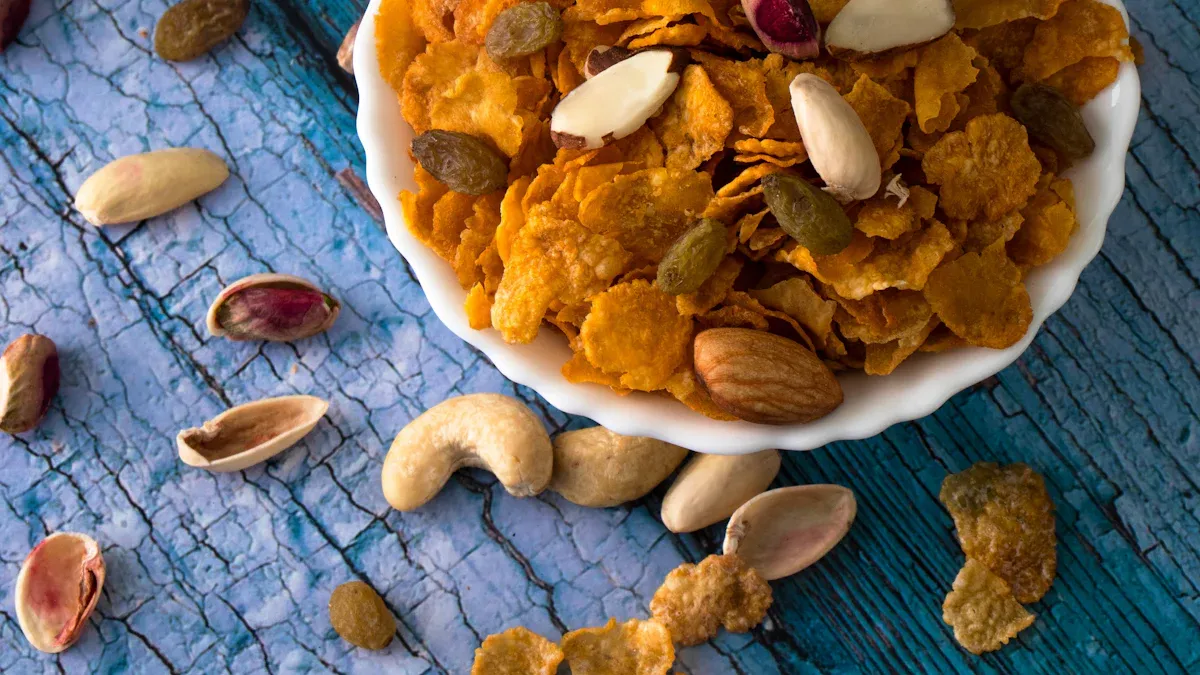
Key Vitamins in Nuts
You find a wide range of vitamins in nuts and nutrition. Almonds stand out for their vitamin E content, providing nearly half of your daily requirement in just one ounce. Cashews supply vitamin K, vitamin E, and important B-complex vitamins like thiamine and vitamin B6. Hazelnuts also deliver high levels of vitamin E. Walnuts contain B vitamins and folate, which help your body produce energy and support cell growth.
Here is a quick look at how different nuts compare in vitamin E content:
Nut Type | α-Tocopherol (μg/100 g) |
|---|---|
Hazelnuts | 2551.0 |
Almonds | 2489.7 |
Macadamia | Lowest |
Cashew | Lowest |
Walnuts | Lowest |
You get many micronutrients from nuts and nutrition, including vitamins A, C, and K, as well as folate and magnesium. These micronutrients help your body function well every day.
Cashews: Vitamin K, vitamin E, thiamine, vitamin B6
Almonds: Vitamin E (48% daily requirement per ounce)
Health Benefits Overview
Nuts and nutrition offer many health benefits. Walnuts may lower your risk of coronary heart disease because of their unique fatty acid profile. You also get polyunsaturated fatty acids, fiber, and polyphenols from nuts, which support your heart and brain.
Eating nuts and berries helps you build a healthy eating pattern. You get essential vitamins, minerals, fiber, and phenolics that improve cardiovascular health, gut microbiome health, and cognitive function.
Walnuts provide n-6 and n-3 polyunsaturated fatty acids, folate, fiber, and antioxidants. Regular nut consumption increases your intake of dietary fiber, calcium, potassium, folate, magnesium, and vitamins A, C, and K. You also get lower sodium levels compared to people who do not eat nuts. The health benefits of nuts come from their rich supply of micronutrients and their positive impact on overall nutrition.
Vitamin and Mineral Breakdown
Vitamin E
You get vitamin E from many nuts. Hazelnuts and Brazil nuts have high levels of vitamin E. Almonds also provide a large amount. Vitamin E helps your body in several ways. It protects your cells from damage and supports your immune system. You may notice better skin health and faster wound healing when you eat enough vitamin E. Older adults need vitamin E to help prevent cognitive decline.
Nut Type | Vitamin E Content (per 100g) |
|---|---|
Hazelnuts | High |
Brazil Nuts | High |
Health Effect | Description |
|---|---|
Heart Health | May help reduce certain heart disease risk factors and dilate blood vessels. |
Immune Function | Plays important roles in immune function and inflammation regulation. |
Cognitive Function | Older adults may need it more to maintain good health and prevent cognitive decline. |
Menstrual Pain Relief | Can reduce pain in women with dysmenorrhea. |
Liver Health | May improve health aspects in individuals with non-alcoholic fatty liver disease (NAFLD). |
Antioxidant Properties | Prevents damage to polyunsaturated fatty acids and destroys free radicals. |
Skin Health | Aids in rapid healing of skin wounds, brightening skin, and reducing wrinkles. |
Immune System Support | Strengthens the immune system and helps in red blood cell formation. |
Physical Endurance | Increases physical endurance and muscle strength. |
Tip: You can meet half your daily vitamin E needs with just one ounce of almonds.
B Vitamins
Nuts give you many B vitamins. Almonds contain riboflavin and biotin. Peanuts provide thiamine, niacin, and biotin. Walnuts also have high amounts of biotin. B vitamins help your body turn food into energy. They support your metabolism and keep your heart healthy. You need B vitamins to help your cells work well.
Nut Type | B Vitamin | Typical Concentration per Serving (DV%) |
|---|---|---|
Almonds | Biotin (B7) | 49% |
Almonds | Riboflavin (B2) | 18% |
Peanuts | Thiamine (B1) | 18% |
Peanuts | Niacin (B3) | 28% |
Peanuts | Biotin (B7) | 88% |
Walnuts | Biotin (B7) | High Amounts |
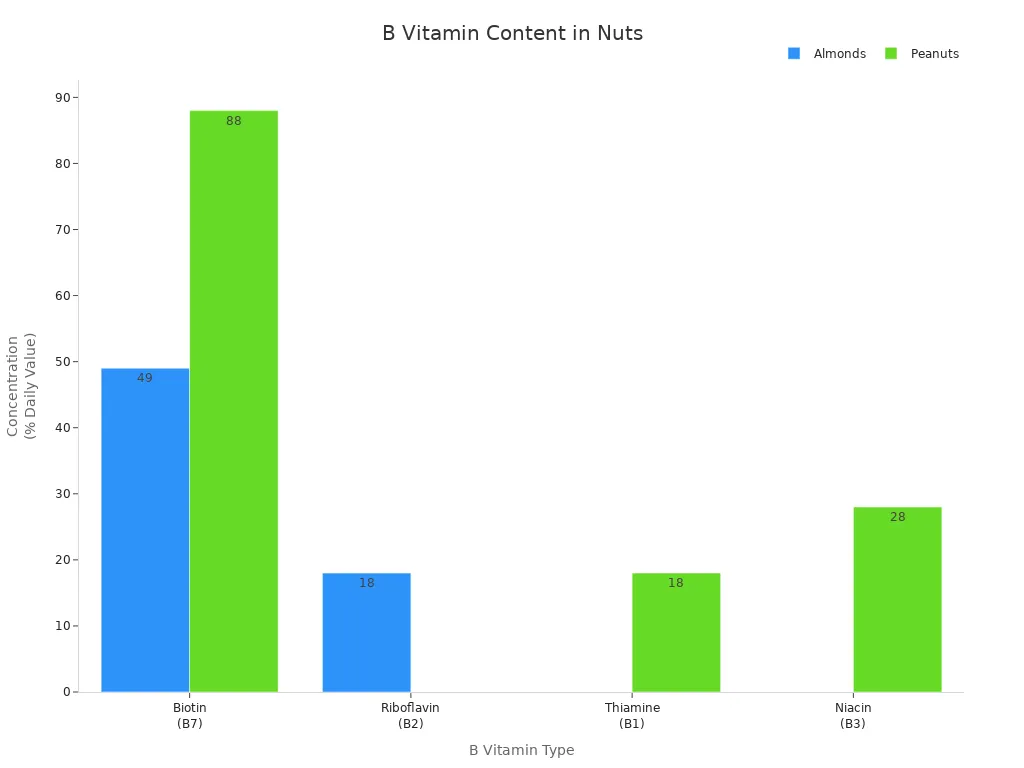
Thiamine (B1) drives carbohydrate metabolism.
Riboflavin (B2) and niacin (B3) help your cells use oxygen.
B6 and B12 regulate homocysteine levels, which supports your heart.
B vitamins act as coenzymes. They help your body convert food into energy and support many metabolic pathways.
Folate
You find folate in several nuts. Hazelnuts, beechnuts, and chestnuts have the highest folate content. Walnuts also provide a good amount. Folate helps your body make new cells. It is important for growth and development, especially during pregnancy. Folate also supports brain health.
Nut Type | Serving Size | Folate Content (mcg) | % Daily Value |
|---|---|---|---|
Dried Beechnuts | 1 oz | 32.1 | 8% |
Hazelnuts | 1 oz | 32.1 | 8% |
Dried Chinese Chestnuts | 1 oz | 31.2 | 8% |
Hemp Seeds | 1 oz | 31.2 | 8% |
Dried Japanese Chestnuts | 1 oz | 31 | 8% |
Dried Ginkgo Nuts | 1 oz | 30.1 | 8% |
Dried Lotus Seeds | 1 oz | 29.5 | 7% |
Toasted Sesame Seeds | 1 oz | 27.8 | 7% |
Walnuts | 1 oz | 27.8 | 7% |
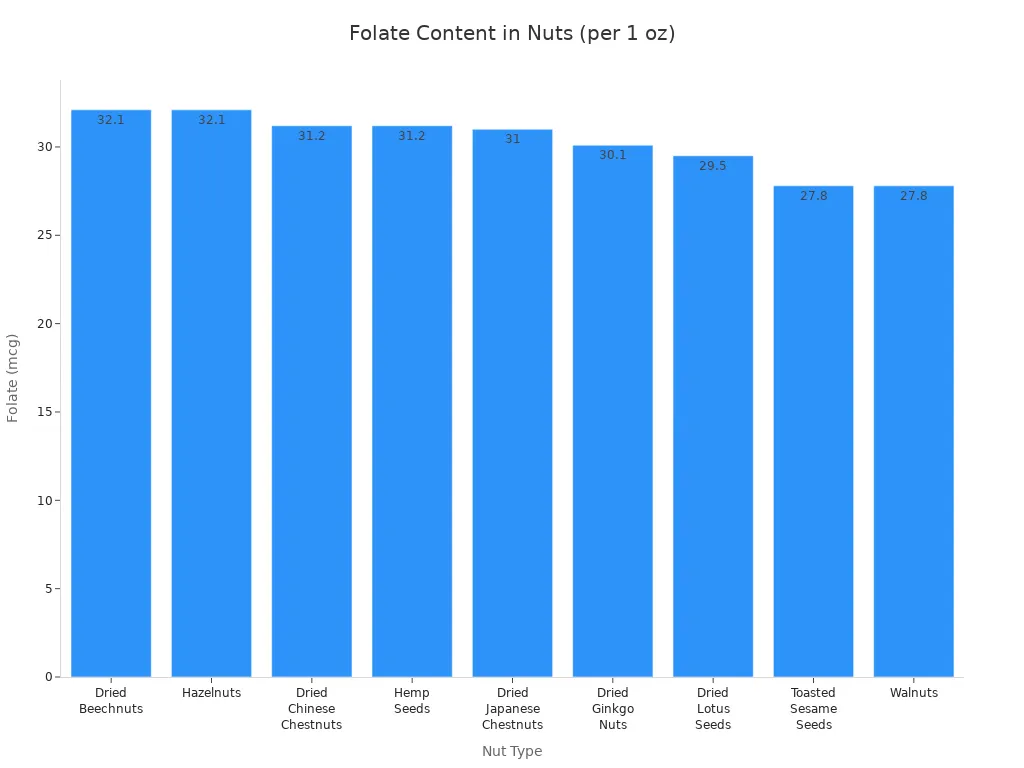
Biotin
You get biotin from almonds and peanuts. A quarter-cup of almonds contains about 1.5 micrograms of biotin. Peanuts also provide biotin, but the exact amount varies. Biotin helps your body break down fats and carbohydrates. It supports healthy skin, hair, and nails.
Almonds: Approximately 1.5 micrograms of biotin per 10 almonds.
A 1/4 cup (30 g) of roasted almonds contains 1.5 mcg of biotin.
Research shows that biotin deficiency is rare in the United States. Most people do not need extra biotin unless they have a medical condition. Some case reports suggest biotin supplements may help children with uncombable hair syndrome. Limited evidence shows biotin may improve skin conditions like rash or dermatitis in infants. Scientists have not proven that biotin supplements improve hair, skin, or nails in healthy people.
Selenium
Brazil nuts have the highest selenium content among all nuts. One Brazil nut contains about 96 micrograms of selenium. This amount is 175% of the reference daily intake. Eating just four Brazil nuts gives you a large dose of selenium. Other nuts provide less than 1 microgram per serving.
Brazil nuts are the highest in selenium content among nuts.
A single Brazil nut contains between 68–91 micrograms (mcg) of selenium.
One Brazil nut contains approximately 96 micrograms (mcg) of selenium, which is 175% of the reference daily intake (RDI).
Most other nuts provide less than 1 mcg of selenium.
Health Benefits of Selenium | Description |
|---|---|
Thyroid Health | Supports thyroid function. |
Cognitive Support | Aids in maintaining cognitive function. |
Antioxidant Protection | Provides antioxidant benefits. |
Heart and Brain Health | Contributes to cardiovascular and neurological health. |
Immune System Support | Enhances immune function. |
Reproductive Health | Important for reproductive health. |
Health Risks of Selenium-Rich Nuts | Description |
|---|---|
Muscle Tremors | Can occur with high selenium intake. |
Hair Loss | A potential side effect of excess selenium. |
Stomach Upset | May result from overconsumption. |
Lightheadedness | A symptom of selenium toxicity. |
Severe Outcomes | Includes heart attack, respiratory distress, or kidney failure. |
Note: You should eat Brazil nuts in moderation. Too much selenium can cause health problems.
Omega-3s
Walnuts are the best source of omega-3 fatty acids among nuts. A 25-gram serving of walnuts gives you about 1.9 grams of alpha-linolenic acid (ALA). Other nuts like almonds, hazelnuts, and chestnuts have very little omega-3 content. Omega-3s help your heart and brain. They lower inflammation and support healthy cell function.
Nut Type | Omega-3 Content (g per serving) |
|---|---|
Walnuts | 1.9 |
Almonds | N/A |
Hazelnuts | N/A |
Chestnuts | N/A |
Walnuts have the highest amount of alpha-linolenic acid (ALA) among nuts.
A 25-gram serving of walnuts provides 1.9 g of linolenic acid.
Other nuts like almonds, hazelnuts, and chestnuts have lower omega-3 content.
Walnuts stand out in the nutritional composition of nuts because of their omega-3 content. You can help prevent vitamin deficiencies by including a variety of nuts in your diet.
Adding Nuts to Your Diet
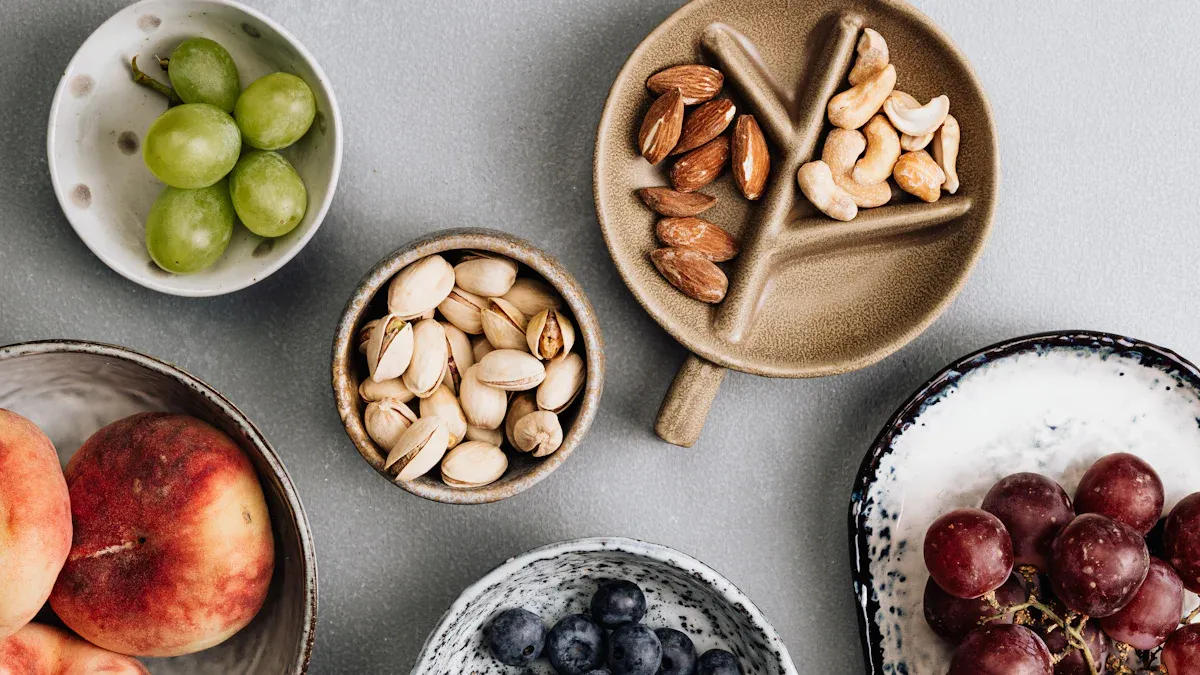
Serving Size Tips
You can support good nutrition by choosing the right serving size of nuts each day. The recommended daily intake for optimal vitamin and mineral intake is 30 grams. This amount equals about 20 almonds or 10 walnuts. You get health benefits such as a reduced risk of heart disease when you follow this guideline. Most nuts contain healthy fats, protein, and fiber. You absorb fewer calories from nuts than you might expect because their fibrous structure prevents complete digestion. For example, a serving of almonds has about 160-170 calories, but your body only absorbs around 129 calories. You can enjoy nuts as part of a healthful diet without worrying about excess calorie intake.
Tip: Measure your nuts before eating to keep your intake within the recommended daily intake.
Variety and Balance
You maximize nutrient intake when you eat a mix of different nuts. Mixed nuts provide a variety of healthy fats, proteins, vitamins, and minerals. You support heart health, weight management, and brain health by combining nuts. You also help regulate blood sugar and reduce inflammation. Mixing nuts allows you to consume a wider range of nutrients at once. You improve nutrient absorption and make your diet more balanced.
Nut Type | Calories | Fat (g) | Carbs (g) | Fiber (g) |
|---|---|---|---|---|
Almonds | 160 | 14 | 6 | 3 |
Walnuts | 185 | 18 | 4 | 2 |
Cashews | 155 | 12 | 9 | 1 |
Hazelnuts | 178 | 17 | 5 | 3 |
Maximizing Nutrient Intake
You can add nuts to meals and snacks in many ways to boost your intake of vitamins and minerals. Try these ideas:
Spiced nuts with cheese and fruit
Almond pesto farfalle
Granola and dark chocolate almonds
Grilled peaches with toasted almonds
Berry trifle parfait
DIY wasabi nut mix
Banana pecan compote
Nut and seed snack bar
No-bake energy bites
Nutty dark chocolate bark
Hazelnut brown butter spaghetti squash
Hazelnut-crusted chicken
Vegan pecan pie
You can include nuts in salads, yogurt, oatmeal, or baked goods. You get more nutrients and flavor when you use nuts in different recipes. Nuts provide protein, fiber, and healthy fats that help you feel full. Regular intake of nuts supports weight management and does not lead to weight gain. You can enjoy nuts every day as part of a healthful diet.
You get important vitamins and minerals from nuts, such as magnesium and zinc. These nutrients help your muscles, nerves, and immune system work well.
Magnesium supports muscle function and energy.
Zinc helps your body heal and grow.
Health Outcome | Risk Reduction (%) |
|---|---|
Cardiovascular Disease | 21% |
Cancer Deaths | 11% |
All-Cause Mortality | 22% |
You improve your diet quality when you eat a variety of nuts. Regular nut consumption lowers your risk of major diseases and supports long-term health. Enjoy nuts daily and measure your serving size for best results.




